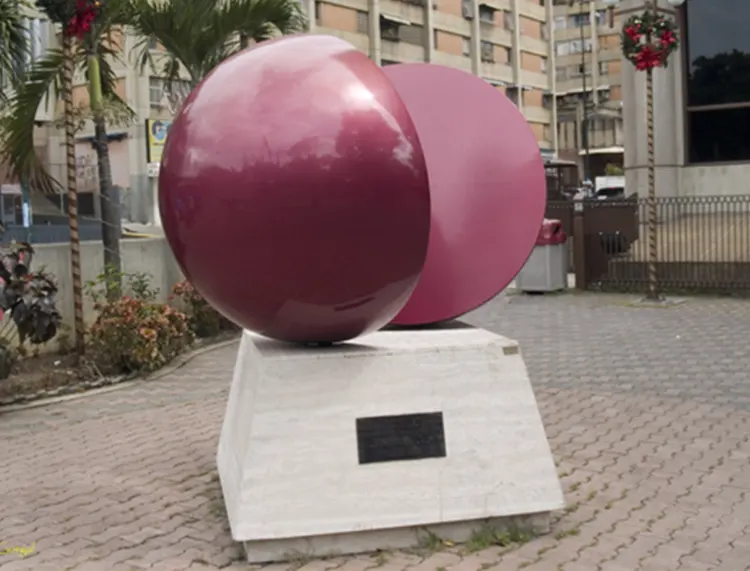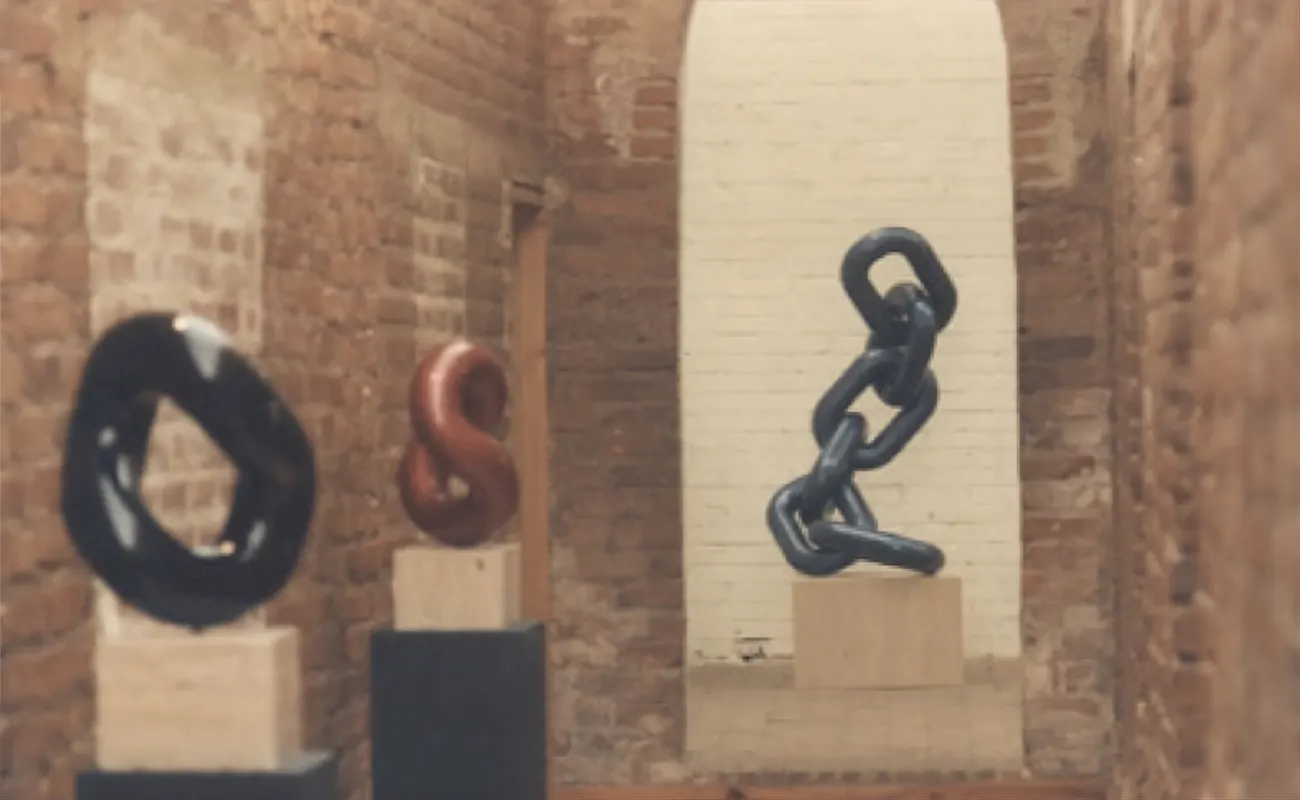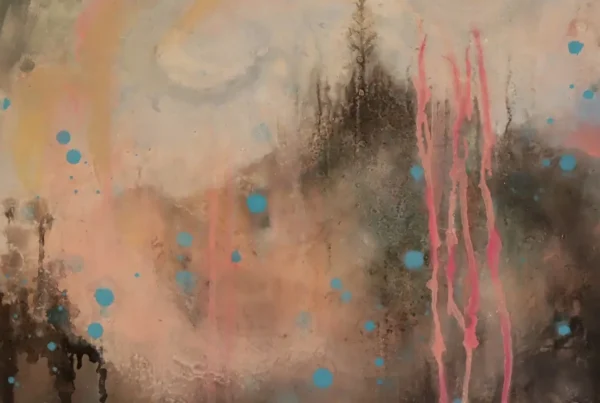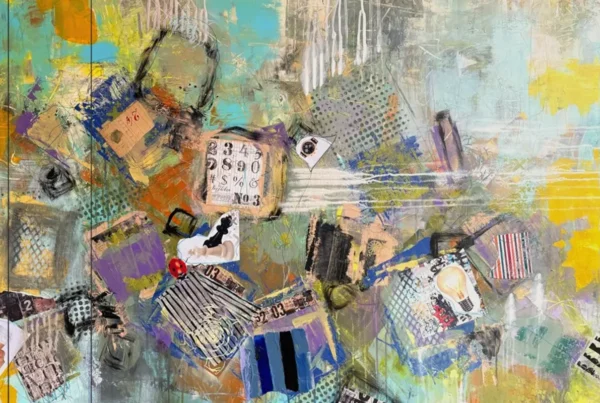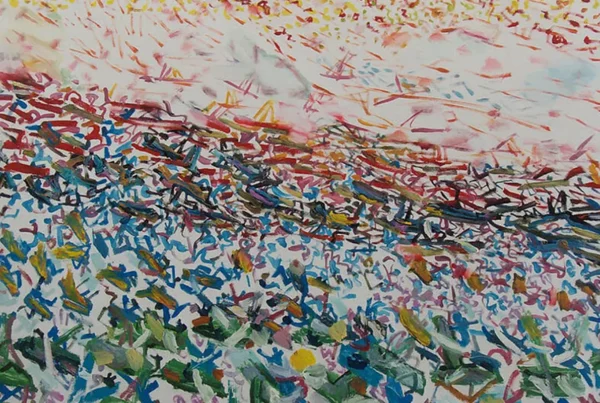Gianmarino Grassi: Melding Iron and Cosmos
Gianmarino Grassi masterfully combines his Italian and Venezuelan heritage into an expressive art form that transcends traditional borders. Born in 1943 in Italy and currently residing in Lisbon, Portugal, Grassi’s artistic path is a captivating story of cultural fusion and creative exploration. His impressive portfolio, boasting over 780 unique sculptures and numerous exhibitions at esteemed locations, demonstrates a deep engagement with both terrestrial and cosmic elements. These exhibitions, ranging from Caracas’s National Art Gallery to New York’s Bruce Lewin Gallery, unveil Grassi’s fervor for exploring space in its vast dimensions.
Grassi’s approach to sculpture is fundamentally rooted in minimalism, aiming for the greatest impact using minimal materials. His preference for metals, particularly iron, highlights his artistic ideology. For Grassi, welding transcends a mere technique; it becomes a transformative process that breathes life into his creations. This method allows him to interlace the cosmos into his art, producing pieces that resonate with structural integrity and dynamic movement. His work, deeply personal and evocative, seeks to explore new shapes and structures, viewing sculpture as a conduit to capture space and the imagination.
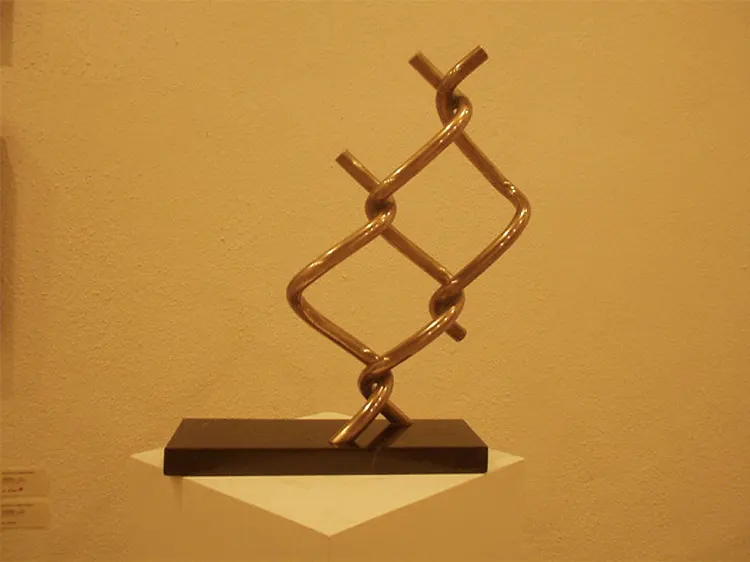
‘Cajas’: Metaphors of the Mind
The ‘Cajas’ series, a pivotal component of Gianmarino Grassi’s body of work, delves deeply into the subconscious and spiritual realms. This collection of sculptures, symbolizing the essence of human perception, acts as a metaphorical examination of the psyche and its interaction with the external environment. The box, as a recurring motif, emerges as a powerful emblem of the feminine, often representing maternal figures or the unconscious. It embodies completeness and spiritual principles, drawing parallels with the myth of Pandora’s Box, which holds the depths of the unconscious, brimming with creative and destructive capabilities.
This series encapsulates Grassi’s artistic paradox: the act of artistically enclosing an object expands its essence beyond physical boundaries. It forges a duality vividly depicted in the ‘Cajas’. These sculptures initially provoke a sense of uncertainty, confronting viewers with the contrast between open and closed spaces. As time progresses, this perception evolves, prompting viewers to internalize the space and harmonize it with their inner selves. Thus, the ‘Cajas’ transform into dynamic psychological landscapes, vessels for the viewer’s subjective, psychological, and symbolic interpretations. Grassi’s ‘Cajas’ transcend visual art; they are profound reflections on the human psyche, inviting an interaction between personal narratives and the external world.
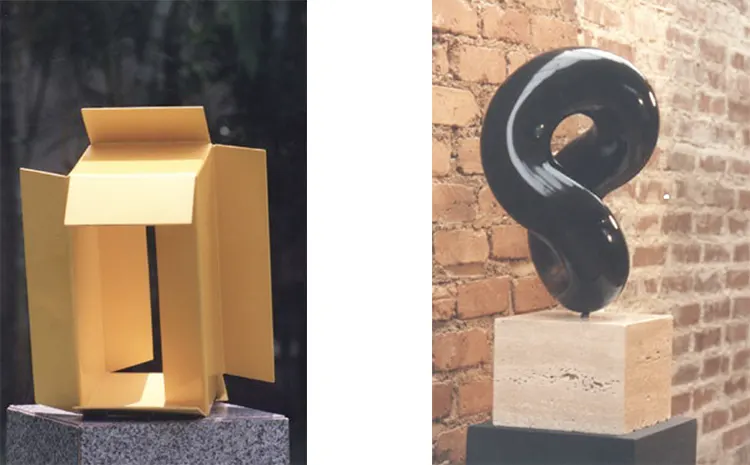
‘Nudos’: Gianmarino Grassi Entwining Tension and Fluidity
Gianmarino Grassi’s ‘Nudos’ series offers a compelling exploration of the knot as a metaphor for the intricate complexities and connections of life. In this series, Grassi transforms knots into large-scale sculptures that emit a sense of tension, movement, and fluidity. Each piece serves as a profound reflection on the interconnectedness and contradictions of existence. These voluminous and dynamic sculptures symbolize the inextricable links of fate, the interconnection of all things, and the complex intertwining of life’s paths. The ‘Nudos’ series represents Grassi’s philosophical contemplation on the human condition, portraying how we are bound by circumstances yet perpetually strive for freedom and transcendence.
The artistic approach in the ‘Nudos’ series goes beyond creating visually striking sculptures; it also evokes deep reflections on the nature of existence. These knots, as both physical and symbolic forms, represent life’s complexities and paradoxes. Grassi’s work encourages viewers to ponder the ties that bind us, the challenges we face, and the intricate tapestry that constitutes our lives, offering a unique perspective on the human experience.
Tropismos: The Dance of Life and Adaptation
In the ‘Tropismos’ series, Gianmarino Grassi delves into the marvels of nature’s adaptation. Inspired by the phenomenon of tropism, this series is a testament to resilience and the inherent drive of life towards growth and survival. Each sculpture, an abstract representation of natural growth patterns, embodies a sense of motion and fluidity, capturing the unseen forces that shape our natural world. ‘Tropismos’ is not merely an artistic expression; it’s a philosophical journey reflecting on the adaptability and resilience of the human spirit, celebrating our innate capacity to overcome and thrive, akin to the ways living beings respond to their environments.
Tangentes: Sculptural Equilibrium and Inquiry
The ‘Tangentes’ series embarks on a fundamental exploration of the structural essence of sculpture. Here, Grassi contemplates the three-dimensional nature of his medium, where the structure of each work is intrinsically linked to the material choice. This series represents a balancing act, a sculptor’s tightrope walk between creative impulse, material limitations, and the ambition to mimic or transcend natural structures. ‘Tangentes’ is notable for its exploration of form and material, creating compositions in space that evoke a sense of weightlessness, challenging the viewer’s perception of balance and gravity. These sculptures, minimal in their point of contact yet vast in their spatial impact, mark Grassi’s experiment with the limits of form, redefining traditional sculptural norms.
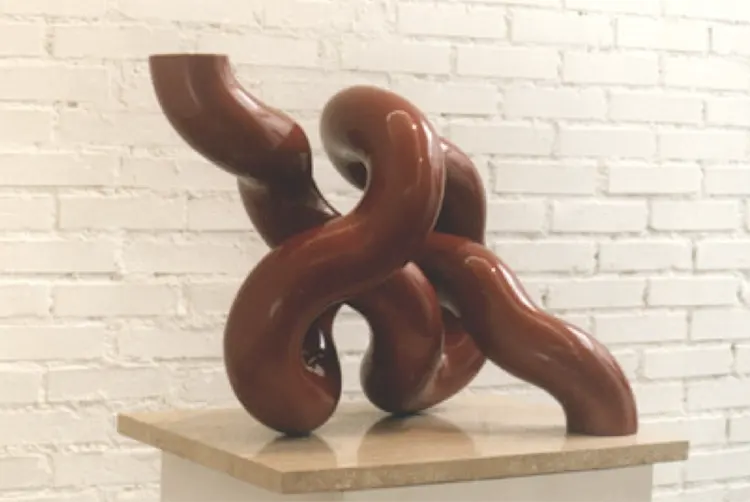
‘Mallas’: A Symphony of Lines and Planes
In the ‘Mallas’ series, Gianmarino Grassi embarks on an artistic journey to bridge the gap between bidimensional forms and tridimensional structures. This exploration is focused on how lines and planes intersect, forming a network that transcends traditional sculptural limits. Grassi’s approach in ‘Mallas’ is a deep dive into the essence of sculptural form, using minimal elements based on lines to evolve towards meshes that appear organic and self-generating. This interaction of lines and vectors gives rise to spatial volumes that are minimal yet complex, capturing the tension and dynamism inherent in their intersection.
The philosophical foundation of the ‘Mallas’ series is deeply rooted in Grassi’s reflection on our interconnected world. He draws parallels between the physical interlacing of lines and the metaphysical connections binding individuals, societies, and cultures. The series serves as a metaphor for the human condition, entangled in a web of experiences, relationships, and existential challenges. Through ‘Mallas’, Grassi invites viewers to ponder the intricate connections that weave the fabric of our lives and the universe, promoting contemplation on the interconnected nature of existence and the complex web of relationships that define it.
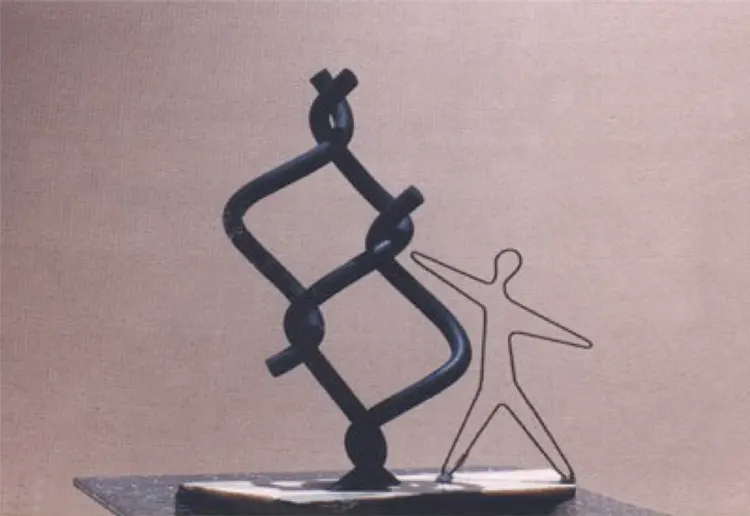
Gianmarino Grassi Harmonizing Nature and Art in ‘La Piedra’
In the ‘La Piedra’ series, Gianmarino Grassi expresses a profound reverence for the timelessness of stone. This series is a homage to the elemental purity and enduring symbolism of stone across cultures and eras. Each piece in ‘La Piedra’ represents a dialogue between Grassi and the natural material, where he shapes the raw, rugged beauty of stone into forms that tell stories of transformation and endurance. The sculptures range from abstract to more defined shapes, each encapsulating a narrative of permanence and transience.
The ‘La Piedra’ series contemplates the enduring nature of stone as a symbol of the eternal, the unchanging, and the fundamental. Grassi’s works in this series encourage viewers to reflect on the passage of time, the persistence of nature, and the human desire to leave a lasting imprint on the world. This series goes beyond mere artistic creation, offering insights into the immutable qualities of nature and the longing of the human spirit for connection with something enduring and significant.
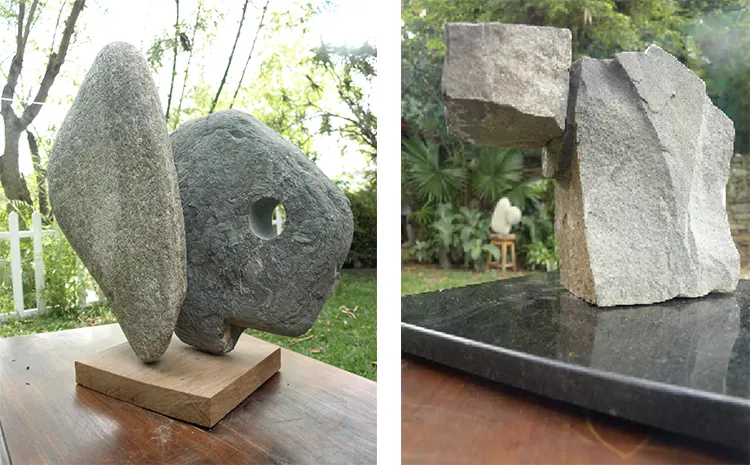
‘Esferas’: Sculpting Cosmic Harmony
The ‘Esferas’ series by Gianmarino Grassi represents an artistic exploration of the sphere as a symbol of fullness, cosmic harmony, and geometric perfection. In this series, Grassi crafts spheres of various sizes and textures, utilizing different materials to underscore the inherent qualities of the shape. The aim of ‘Esferas’ is to achieve a balance between form and space, where each sphere encases a universe within itself, resonating with themes of unity and infinity.
‘Esferas’ serves as an artistic meditation on the cyclical nature of existence and the interconnection between the macrocosm and the microcosm. The spherical sculptures of Grassi, without beginning or end, mirror the ongoing nature of life and the universe. This series invites viewers to engage with ideas of totality and the cyclical patterns of existence, offering a unique perspective on universal themes. Through the ‘Esferas’ series, Grassi involves the audience in a dialogue that transcends the physicality of the sculptures, touching upon deeper, more universal truths.
Scalability: Adapting to Space and Context
A distinctive characteristic of Grassi’s work is its remarkable scalability, whether situated in intimate environments or expansive open spaces, his sculptures adapt flawlessly, maintaining their impact and integrity. This versatility is evident throughout his series, from the expansive ‘Nudos’ to the detailed ‘Mallas’, each piece designed to resonate within its environmental context. This feature not only demonstrates Grassi’s mastery of form and space but also accentuates the dynamic nature of his creations, adaptable yet consistently profound.
The Artist’s Method: A Beacon for Aspiring Sculptors
Gianmarino Grassi’s approach to art is a fusion of philosophical depth and technical expertise, serving as a guiding light for emerging artists. His method, deeply rooted in a concept-first approach, stresses the importance of the generative idea as much as the final material outcome. Grassi’s work process, marked by a contemplative engagement with materials and forms, offers invaluable insights into the art of sculpting. This approach, prioritizing the idea as the genesis of creation, is a crucial lesson for young artists delving into the realms of plastic language, emphasizing the significance of concept in artistic expression.
